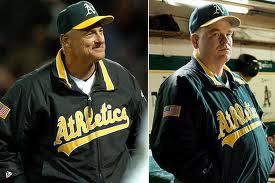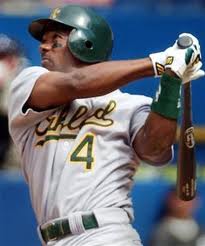The film "Moneyball" opened this past weeked, and it is based on the Michael M. Lewis book by the same name. Brad Pitt plays Oakland Athletics' general manager Billy Beane who battles the second lowest payroll in baseball with sabermetrics.
( Spoiler Alert )
Mets Blob did not ever read the book but caught the film this weekend. The film starts off with the 2001 A's falling 3-2 to the New York Yankees in the ALDS. Leading into the 2002 season, Beane is faced with the challenge of replacing Johnny Damon, Jason Giambi, and Jason Isringhausen who were all lost to teams with bigger payrolls. Baseball has always been a sport measured by math and statistics. Sabermetrics, to a degree, eliminates many of the traditional elements of building a baseball team and goes directly after the mathematical numbers needed to win.
Mets Blob found it very interesting that a film based in the idea that facts and numbers don't lie did its very best to twist them for the sake of Hollywood. Since baseball is so well tracked by numbers, it's easy to find the flaws and fact twisting in this film.
Here are a few areas that should be questioned:
Casting
Hollywood is known for taking liberties when it comes to casting real life figures. The Blob's favorite example was the 1956 film "The Conqueror" when John Wayne played Genghis Khan.
Paul DePodesta
Moneyball's biggest casting gaff, or perhaps cruelty, was casting the blobbish Johan Hill as Paul DePodesta.
Hill plays Peter Brand who in reality is Paul DePodesta, the NY Mets current VP of Player development and scouting. While Hill's Brand went to Yale, and in real life DePodesta went to Harvard and is known for ushering the Moneyball concepts in Oakland under Billy Beane, that's about where the reality ends. The socially awkward, desk jockey, globe of a nerd that Hill depicts is nothing like DePodesta. DePodesta, in fairness, is a brainy baseball stat geek, but he is also a jock himself. DePodesta played baseball and football at Harvard and obviously knows more about sports than just the numbers...he also seems to know that enjoying sweets in moderation is a healthy choice.
Another mistruth the film depicts is Beane plucking DePodesta out of the obscurity of the Cleveland Indians' front office in between the 2001 and 2002 seasons. DePodesta did work in Cleveland but started in Oakland in 1999 and was not the out-of-the-blue math angel the film makes him out to be.
Philip Seymour Hoffman as Art Howe
No Met fan would ever tell you that Art Howe was as charismatic as Bobby Valentine, but in no way is he the grumpy, chubby, clueless sour puss that Hoffman and the film make him out to be. Maybe Hoffman (a Yankee fan) never bothered to meet the man and did his own take on it. But something tells the Blob that if it had been possible for Hoffman to meet Truman Capote (had he been alive) before he portrayed him in "Capote," he would have jumped at the chance and built a Studio 54 replica for them to hang out in with Bianca Jagger. The Blob feels Hoffman is a fine actor, but in this case did a half assed job and a big disservice to a man's legacy who had been in professional baseball as a player and a manager since 1971.
At one point Hoffman's Howe approaches Billy Beane during the season asking for an extention to his one year contract. The truth is Howe was in the middle of a two year deal, and his contract was not up until the end of the 2003 season. Howe also claims to have never at any point in his career asked to talk about his contract during the season.
Art Howe and Billy Beane
Moneyball makes Howe out to be a joke who knows nothing about the game. In the film when baseball announcers talk about what a great job Howe was doing with the team during their amazing 20 game win streak in 2002, Beane and Brand laugh as if he had nothing to do with it. In the years leading up to the 2002 season, Art Howe lead the A's to 87 wins in 1999, 91 wins in 2000, and 102 wins in 2001 before the 103 win 2002 season. Clearly, he knew a thing or two about what team to put on the field and what moves to make during a game.
Pitching
Never was the starting pitching mentioned as part of the winning baseball formula in the film. In 2002 the A's had 3 legit bad ass starters in Barry Zito (23-5), Mark Mulder (19-7), and Tim Hudson (15-9).
Also not given credit was the A's new closer, Billy Koch, who picked up 44 saves with 11 wins and only 4 losses. By doing simple Blobermetrics, those 4 pitchers hand a huge hand in 68 of Oakland's 103 wins in 2002.
Miguel Tejada
Rarely mentioned and hardly seen in the film was the A's Miguel Tejada, the 2002 American League MVP. Tejada at the time may have been aided by performance enhancing drugs, but the fact is his 2002 numbers were huge. Tejada batted .308, hit 34 Home Runs, 30 doubles, and drove in 131 runs.
*Eric Chavez also hit 34 home runs and drove in 109 runs.
In Moneyball, we see a Billy Beane who's fueled by the idea of reinventing the baseball scouting wheel. He feels the old system must be flawed because it's the same system that once labeled him as a 5 tool prospect out of high school. Beane was drafted in the 1st round by the New York Mets and opted for pro baseball over college. The Mets thought Beane was going to be a more refined Darryl Strawberry, the type of player that could dominant the game. In the end, Beane never could hit at the major league level. The Mets were wrong about Beane, but does that make the whole system wrong? The Blob does not think so.
If you look at the big picture, a balance of both styles is more than likely best for building a team. The Moneyball concept is valid, compelling, and was no doubt a game changer. But if numbers don't lie, then why does the film?
The film lies because Billy Beane still has the ego of an entitled Major League super star who could never back it up on the field. He needs to fill the void a cheering crowd never would for him as a player. Is it sad Beane never became the player the Mets thought he would be? Not really. Millions would have killed for the chance he got that led him to a very successful life in the game of baseball, the game he loves. You can still check out Moneyball and enjoy the film. But check your facts and take it all with a big grain of ballpark pretzel salt.












No comments:
Post a Comment